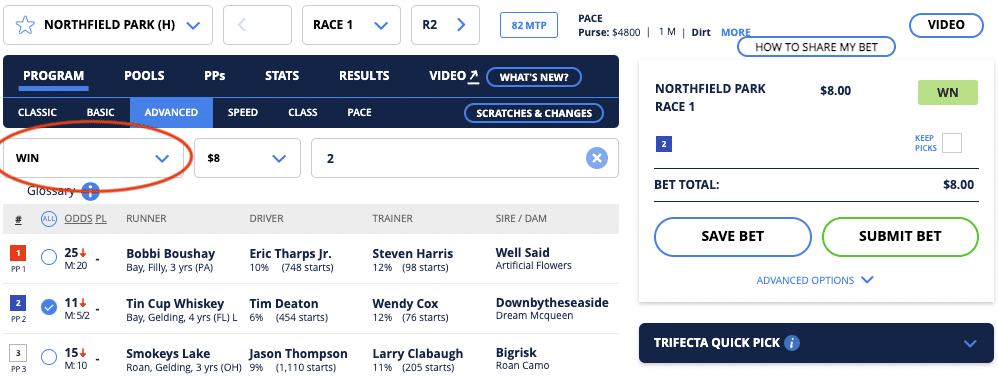The win bet is the most basic form of wager in horse racing. Also known as the “straight bet” or “single,” the win bet is a proposition on a single horse to win the race outright.
The bet wins if the selected horse finishes in first place and loses on any other outcome. If the selected horse crosses the finish line first, the win bet pays. If the horse finishes in any other position, whether that’s second place or twelfth, the bet loses.
Win bets feature the longest odds and best payouts of all straight bets, but win bets are also the most difficult straight bets to win.
 $200 Deposit BonusTwinSpires Offer Code: BET200
Void where prohibited. Terms and conditions apply. Offer for TwinSpires Racing only. See TwinSpires.com for details. Must be 18+ (21+ where applicable). For help with a gambling problem, call 1-800-GAMBLER.
$200 Deposit BonusTwinSpires Offer Code: BET200
Void where prohibited. Terms and conditions apply. Offer for TwinSpires Racing only. See TwinSpires.com for details. Must be 18+ (21+ where applicable). For help with a gambling problem, call 1-800-GAMBLER.
 $150 Deposit BonusAmWager Promo Code: BUSA150
Promotional offer valid and continues until further notice.
Open to new AmWager account holders who have not previously opened an AmWager account. Individuals may only have one (1) AmWager account and may only qualify for a signup promotion one (1) time.
The First Deposit Match Bonus promotion applies to the first deposit made; any subsequent deposits will not apply.
The amount of the first deposit will determine the amount of the bonus and bets that must be placed to earn the bonus. For example, to qualify for the maximum bonus of $150 an initial deposit of $150 is required and total bets must equal $150 or more within 30 days of sign up. Cancelled wagers and refunded wagers are not eligible and will not be counted towards the promotion.
The total promotional wagering credits will be credited to the AmWager account in a single deposit within seven (7) business days of meeting the betting requirements for this promotion. Any promotional wagering credits deposited to a player’s account must be wagered and cannot be withdrawn from the account. Any winnings from those wagers are cash and can be withdrawn.
Any portion of the promotional credits unused expires after 30 days.
Account must remain in good standing to be eligible for all promotions. Returned deposits during the promotional period will cancel eligibility to receive promotional wagering credit.
Limit one promotional offer per household.
$150 Deposit BonusAmWager Promo Code: BUSA150
Promotional offer valid and continues until further notice.
Open to new AmWager account holders who have not previously opened an AmWager account. Individuals may only have one (1) AmWager account and may only qualify for a signup promotion one (1) time.
The First Deposit Match Bonus promotion applies to the first deposit made; any subsequent deposits will not apply.
The amount of the first deposit will determine the amount of the bonus and bets that must be placed to earn the bonus. For example, to qualify for the maximum bonus of $150 an initial deposit of $150 is required and total bets must equal $150 or more within 30 days of sign up. Cancelled wagers and refunded wagers are not eligible and will not be counted towards the promotion.
The total promotional wagering credits will be credited to the AmWager account in a single deposit within seven (7) business days of meeting the betting requirements for this promotion. Any promotional wagering credits deposited to a player’s account must be wagered and cannot be withdrawn from the account. Any winnings from those wagers are cash and can be withdrawn.
Any portion of the promotional credits unused expires after 30 days.
Account must remain in good standing to be eligible for all promotions. Returned deposits during the promotional period will cancel eligibility to receive promotional wagering credit.
Limit one promotional offer per household.
 $200 Deposit BonusDRFBets Promo Code: STAKES
Must be 18 or older (21 in AL, AZ, IA, IN, KS, NH, ND, WA) to open an account with DRF Bets and reside in a state where such activity is legal. Void where prohibited. Always Wager Responsibly. If you think you might have a problem, please contact the National Gambling Helpline (800) 522-4700. T&Cs Apply.
$200 Deposit BonusDRFBets Promo Code: STAKES
Must be 18 or older (21 in AL, AZ, IA, IN, KS, NH, ND, WA) to open an account with DRF Bets and reside in a state where such activity is legal. Void where prohibited. Always Wager Responsibly. If you think you might have a problem, please contact the National Gambling Helpline (800) 522-4700. T&Cs Apply.
21+ to Play, T&Cs Apply. Gambling Problem? Call 1-800-GAMBLER
Straight Bets And Win Bets In Horse Racing
Alternate names for the win bet can confuse new parimutuel bettors because the win bet is sometimes referred to as a “straight bet.” However, the term “straight bet” is also used to distinguish simple horse racing bets (win, place, and show) from exotic wagers such as the trifecta, superfecta, and so on.
If you hear the term “straight bet” and it doesn’t make sense in the context of distinguishing it from exotic wagers, the person using the term is likely talking about a simple win bet.
Horse Racing Win Bet Examples
For an example of how a win bet works, we’ll use an imaginary race with four horses for simplicity’s sake. The odds posted below are the odds the horse went off at, not at the opening morning line.
Remember, in parimutuel betting, the odds fluctuate as money comes in until post-time. The morning line odds reflect how the track’s oddsmaker believes the public will bet, but they are subject to change based on betting action.
In this example race, the horses finished in the order stated below.
- Horse A: 4-1 odds, second-place finish
- Horse B: 1-2 odds, third-place finish
- Horse C: 12-1 odds, first-place finish
- Horse D: 10-1 odds, tenth place finish
If you had decided to back the pre-race favorite in this race, you would have bet on Horse B at 1-2 odds. Had Horse B finished first, a $2 bet would have returned $3 (1-2 indicates that for every $2 you bet, you will net $1 if your pick wins). However, Horse B finished in third place, and all win bets on him lost.
On the other hand, if you had decided to back the biggest pre-race longshot, you would have bet on Horse C at 12-1. A $2 bet on Horse C would have paid $26 (12-1 indicates you stand to net $12 for every $2 you bet, resulting in a $2 bet paying $24 plus the return of your $2 wager).
To clarify how the win bet works, note that the only win bet that would have paid in this race was the straight bet on Horse C. Every other win bet would have lost because win bets only pay for 1st place finishes.
How to Place Win Bets Online
Once you have a handle on how horse racing win bets work, the mechanics of placing them online are simple. A typical online racebook offers the win bet as the default wager when customers open any race, so it’s easy to find the wager and submit it.
Placing a win bit on a horse race begins by logging in to the online racebook of your choice and selecting an upcoming race. Most horse racing betting sites prominently list imminent races on the front page after logging in, so anyone who wants to try a win bet can get started right away.
Clicking or tapping on an upcoming race brings users to the detailed view that lists all runners, their trainers, jockeys, track conditions, betting odds, and much more. In most cases, the win bet is active by default, so all that’s required is to select a horse and choose an amount to wager. This screenshot from TwinSpires shows what it looks like to place a win bet immediately after opening an upcoming race card:

In this example, I have selected Tin Cup Whiskey and set the bet total to $8.00. The betting slip to the right side shows my selection (horse #2), the type of bet, and total amount wagered.
Getting this screenshot was as simple as logging in, selecting the next race, selecting my horse, and adjusting the wager size. If everything looks good, hit the “submit” button, and the wager will go live. Bettors can use the dropdown menu directly above the first runner to select a different type of bet.
There are minor differences in how various horse racing betting sites organize their wagering interfaces, but the above example is pretty standard. Once you know how to place a win bet at one racebook, you’ll have no trouble doing the same elsewhere.
Why Horse Racing Odds Fluctuate
Before every race, the track oddsmaker sets the morning line odds, which are issued to the public to give bettors some sense of which horses are favored, which are underdogs, and so on.
The oddsmaker uses his handicapping experience to set the morning line odds, but the oddsmaker’s job is not to handicap the race. The oddsmaker’s job is to set the odds according to how he thinks the public will bet. That may sound like a minor, nitpicky difference, but it is important for bettors to remember that the odds do not necessarily represent which horse is most likely to win.
After the odds are posted, the public money starts coming in and begins to impact the odds. Bettors will come in and make decisions based on the odds, each horse’s post position, jockeys’ reputations, trainers’ reputations, each horse’s personal race history and pedigree, and any news that comes out of each horse’s camp.
The public money pushes the odds on each horse in one direction or the other as the week goes on. If a bunch of money comes in on any one horse, that horse’s odds will shorten. That’s the nature of parimutuel wagering, in which all wagers are pooled together and winning bets paid with the money from that pool.
Potential Payoffs On Win Bets
Win bets feature some of the best payouts in horse racing because the odds that any one horse will win the race are relatively small. Even race favorites tend to have the odds of working against them due to the level of competition and difficulty in placing first.
Bettors do not often win with straight bets, but a single win can make up for many lost bets before it. A horse running at 30-1, for example, would pay $3,100 on a $100 bet.
Below is a list of some of the most common odds assigned to horses alongside the total payout on a $2 bet, the minimum wager at most races. Note that the payoff amounts below include the return of the original $2.00 wager.
- 1-9: $2.20
- 1-5: $2.40
- 2-5: $2.80
- 1-2 $3.00
- 3-5: $3.20
- 4-5 $3.60
- 1-1: $4.00
- 6-5: $4.40
- 7-5: $4.80
- 3-2: $5.00
- 8-5: $5.20
- 9-5: $5.60
- 2-1: $6.00
- 5-2: $7.00
- 3-1: $8.00
- 7-2: $9.00
- 4-1: $10.00
- 9-2: $11.00
- 5-1: $12.00
- 6-1: $14.00
- 10-1: $22.00
- 12-1: $26.00
- 15-1: $32.00
- 20-1: $42.00
- 30-1: $62.00
- 40-1: $82.00
- 50-1: $102.00
- 100-1: $202.00

